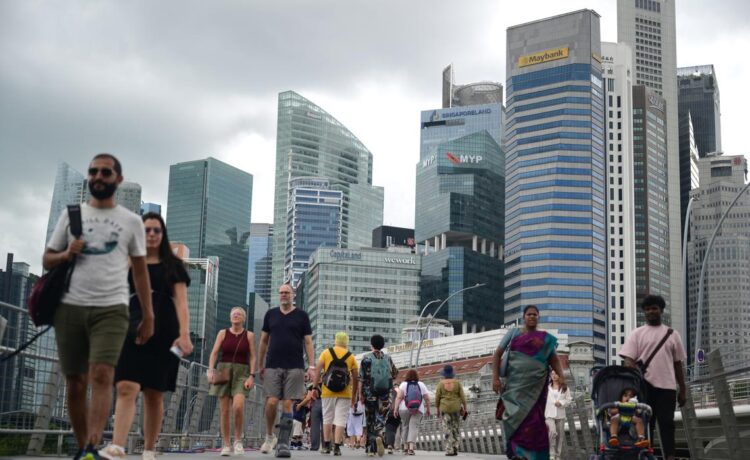SINGAPORE – Singapore attracted 6.3 per cent more in fixed asset investments in 2024 than the year before, but the global investment environment in 2025 is expected to remain challenging amid geopolitical uncertainties and the rise in trade wars.
The Republic drew $13.5 billion in such commitments, up from $12.7 billion in 2023, the Economic Development Board (EDB) said in its annual year-in-review on Feb 6.
Fixed asset investments refer to a company’s incremental capital investment in facilities, equipment and machinery.
The electronics sector took the lead, accounting for about 57 per cent of total investment commitments on the back of a bullish semiconductor outlook driven by emerging trends like artificial intelligence (AI) and digitalisation.
Asked whether the US investigation into Chinese start-up DeepSeek’s acquisition of Nvidia semiconductor chips through intermediaries in Singapore poses a risk to chip manufacturing investments here, EDB referred to an earlier Ministry of Trade and Industry statement which said it expects US companies like Nvidia to comply with the country’s export controls and laws.
Following the electronics sector was biomedical manufacturing at 16.5 per cent, and headquarters and professional services at 8.4 per cent.
The chemicals sector saw a significant decline, from 35.6 per cent in 2023 to 2.7 per cent in 2024. EDB said the drop was due to an excess supply of chemicals being produced globally.
Other new growth areas include precision engineering, AI and sustainable products and services. EDB did not elaborate on these areas.
In all, the projects secured in 2024 are expected to create around 18,700 new jobs when they are fully implemented in the next five years, a 6.71 per cent decline from the preceding year.
When asked about the decline, EDB managing director Jacqueline Poh said the drop in percentage terms was negligible and that the tally was still above its medium-term goal.

EDB chairman Png Cheong Boon with managing director Jacqueline Poh at EDB’s annual year-in-review media briefing on Feb 6. ST PHOTO: KUA CHEE SIONG
Of the jobs to be created, 46 per cent will be in services, 37 per cent in manufacturing, and the remaining 17 per cent in research and development (R&D) and innovation.
The majority of jobs committed will be professional, manager, executive and technician roles.
Almost two-thirds of these new jobs are expected to pay a gross monthly wage above $5,000, EDB said.
When asked how US trade tariffs will affect investments in Singapore, Ms Poh said that protectionist policies are on the rise.
She noted that while Singapore has a trade deficit with the US, it does not mean that the Republic will not be affected by trade tariffs.
“We are an open and highly trade-dependent economy… So, one way or another, if there are pervasive tariff regimes and protectionist policies enacted by various countries in the world, this will have an impact on global growth and trade, and these will have an impact on the general investment climate,” she said at EDB’s media briefing on Feb 6.
Hence, EDB said, the investment environment in 2025 is expected to remain challenging, owing to significant headwinds from geopolitical and macroeconomic uncertainty, while protectionist policies will weigh on companies’ investment decisions.
“Nonetheless, Singapore will continue to benefit from tailwinds arising from Asia’s growth – Asia’s economy is expected to expand from close to 50 per cent of the world’s GDP (gross domestic product) today to about 60 per cent by 2030,” it said.
“Greater economic integration within South-east Asia will improve supply chains and enhance Singapore’s position as a gateway to a fast-growing region with favourable demographics and a growing middle class.”
EDB said total business expenditure came to $8.4 billion in 2024, with the headquarters and professional services sector making up 63.9 per cent.
Companies from the US, China and Europe used Singapore as a base for operations and R&D partnerships, strengthening its position as an innovation hub for regional and global markets.
Singapore captured quality investments from various regions, including the US, Europe and Asia.
While investments from China and Japan declined when compared with 2023, the Republic saw increased interest from American businesses.
EDB chairman Png Cheong Boon said that the projects secured by EDB in 2024 support Singapore’s national effort to build a more diversified and resilient economy, in addition to bringing in jobs and business opportunities.
Mr Png said: “To remain a choice location for high-performing companies, we will strengthen our local ecosystem as enablers and prepare our workforce to seize new job and leadership opportunities.
“By ensuring Singapore remains relevant in global value chains, we can attract and anchor investments that benefit our economy, enterprises and people for the long haul.”
Looking ahead, EDB said it will focus on attracting investments in key sectors and emerging growth areas, covering the full value chain from manufacturing to headquarters, innovation, R&D and supply chain management.
It will also double down on areas such as AI, digitalisation and climate technologies, and strengthen Singapore’s position as a global hub for start-ups and innovation.
This includes attracting global start-ups and founders, especially those in the technology and growth areas, and working with A*Star, Enterprise Singapore and other government partners to boost Singapore’s research, innovation and enterprise ecosystem.
EDB will also continue nurturing more collaborations between multinational corporations, Singapore businesses and research institutions so that these partnerships can help companies seize more opportunities in the region.
It also noted that the new Johor-Singapore Special Economic Zone will pave the way for more opportunities for companies here.
Join ST’s Telegram channel and get the latest breaking news delivered to you.

















